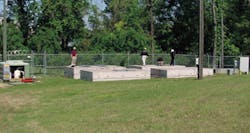Sinking the Putt
A water reuse system set up in Jacksonville, Fla., by Millennium Specialty Chemicals provides free irrigation for a public golf course, saving millions of gallons of water and preventing toxic levels of metals from flowing into nearby Moncrief Creek. The system uses a multistep process that includes a settling basin, UV disinfection, a passive StormFilter filtration system and noncontact cooling water.
The challenge
Millennium Specialty Chemicals was having difficulty meeting National Pollutant Discharge Elimination System (NPDES) permit discharge limits for metals—primarily copper—at its manufacturing facility that uses groundwater for cooling. During the cooling process, evaporated water increases the metals concentration in the cooling water. Millennium discharges up to 250,000 gal per day of noncontact cooling water and boiler and cooling-tower blowdown.
Facing an $80,000 fine from the Florida Department of Environmental Protection (FDEP), Millennium chose to comply by participating in an in-kind water reuse project. It decided to install a system to treat its cooling water and provide a portion of the treated water, at no charge, to The First Tee of Jacksonville golf course for irrigation.
The solution
Millennium had been using a shallow concrete basin that retained water for 120 minutes, allowing particulates to settle before discharging the noncontact cooling water into Moncrief Creek. Tests of the basin by the state in 1999 showed the water exceeding NPDES permit benchmarks for metal and bacteria levels.
Millennium attempted to meet permit limits by replacing the basin with a new collection pond that provided additional settling. Instead of two hours, the new pond held water for four to six days. While this improved the quality of the water being discharged, it was insufficient to reduce metals levels for compliance. The state required that Millennium add another level of treatment for compliance.
“We did not want to go to chemical treatment because it creates more waste and is capital intensive,” said Mike Tipping, environmental manager at Millennium Chemicals.
Golder Associates Inc.—an international environmental consulting firm with offices in Tampa—recommended the Stormwater Management StormFilter. The StormFilter is a passive, siphonic, flow-through filtration system with a concrete vault that houses rechargeable, media-filled filter cartridges. As storm water passes through customized media-filled cartridges, the cartridges remove suspended solids, oil and grease and absorb pollutants such as metals and nutrients. Contech Construction Products Inc. recommended using layered perlite/zeolite media to physically filter sediment, removing oil and grease with perlite and metals by surface area contact and cation exchange with the zeolite.
Due to the volume of water being treated and the need for uninterrupted flow, Contech recommended installing two parallel treatment trains to ensure continuous treatment and meet benchmark goals. Each filter train consists of two 8-ft-by-16-ft precast vaults holding 20 cartridges each—a total of four filter vaults and 80 cartridges on site. From the settling basin, gravity routes water to one of the two parallel StormFilter trains using a timed control valve, which alternates flow between the trains at 12-hr intervals. A UV disinfection system installed between the settling basin and the filtration system kills microorganisms—such as algae and bacteria—before introducing the water to the filter units.
The results
With the treatment system in place, the company wanted to dedicate a portion of the water to irrigating the nearby golf course. It built a new pipeline stretching more than a mile to carry treated water from the filtration system to the course. Millennium typically provides the course 125,000 gal per day free of charge, and it discharges the remaining treated water into the creek. Without this water, the golf course would use groundwater for irrigation, further depleting this valuable water resource at a cost of thousands of dollars per year.
“Not only are we greatly reducing our discharge, but we are also creating a lot of community goodwill,” Tipping said.
State statutes mandate that water reuse be an integral part of water resources management. The FDEP developed a reuse program as a means to reduce groundwater consumption. Through this program, reclaimed water is used for the irrigation of public access areas, residential lawns and edible food crops. In 2002, Florida reused about 584 million gal of water per day.
The FDEP has strict procedures that ensure treated water is safe for use, including continuous monitoring of all reused water. In order to sustain compliance with its permit, Millennium regularly maintains its treatment system every 15 to 18 months. What started as a compliance issue turned into a collaborative effort between Millennium Specialty Chemicals and the FDEP. In compliance since installing the treatment system, Millennium has not only decreased the discharge into Moncrief Creek, but also reduced demand on natural groundwater.
“It was a positive experience all around,” said Tipping. “By participating in the water reclamation process, we were able to get into compliance and also contribute to our community.”


